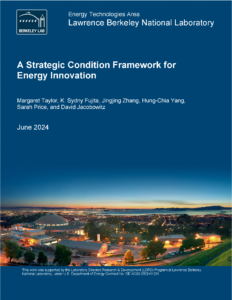Welcome to the Energy I-SPARK value chain explorer tool: Energy Innovation, Strategy, Policy, and Research Knowledge for decision-makers, entrepreneurs, and analysts.
What is Energy I-SPARK?
Energy I-SPARK is a curated data aggregation, research, and analysis enabling platform. It makes valuable market structure and knowledge condition information on energy value chains accessible to decision-makers, entrepreneurs, and analysts. The current version of the framework is built primarily around exploring utility-scale solar and on-shore wind power as they feed into U.S. power markets.
Please note that we are still in the process of building and expanding this tool. In the future, we plan to add further detail to the components of the wind and utility-scale solar value chains, include value chains for other electricity generation technologies, and explore the activities of consumers of electricity. We also plan to add a query interface for presenting related information, both between industries as well as longitudinally within industries.
Background:
We developed Energy I-SPARK as a tool for decision-makers, entrepreneurs, and analysts who aim to assess the future development and adoption of clean energy technologies. The quality of energy-related technology assessments can be improved through improved understanding of the market structure and knowledge conditions of different steps of energy value chains as they connect to U.S. power markets. The market structure (e.g., industry concentration, extent of product differentiation, entry conditions, vertical integration, etc.) of a given value chain step is important to understanding several aspects of the future of a given technology, including: barriers or opportunities for new energy-related technologies and the presence of market power across the steps of an energy value chain. These factors have implications for modeling the price, quantity, and quality of goods offered for sale in an energy value chain and the likely effectiveness of policy instruments that price the negative externality of pollution, as well as for the rate and direction of technological change in each value chain step. The knowledge conditions (e.g., the nature of the knowledge generated and the extent to which the value of that knowledge is privately captured) of a given value chain step is important to understanding such issues as the knowledge barriers or opportunities for entrepreneurs and the expected impact of public investment in new knowledge in each value chain step.
The Energy I-SPARK was developed for a project funded under the Laboratory Directed Research and Development (LDRD) program (Contract No. DE-AC02-05CH11231).
You can download the latest report on the Energy I-SPARK framework by clicking on the image below.
How to cite us:
Energy I-SPARK
Clean Energy Innovation Decision Science (CEIDS)
Building Technology & Urban Systems Division
Energy Technology Area
Lawrence Berkeley National Laboratory
bestar.lbl.gov/ceids; seeds.lbl.gov
